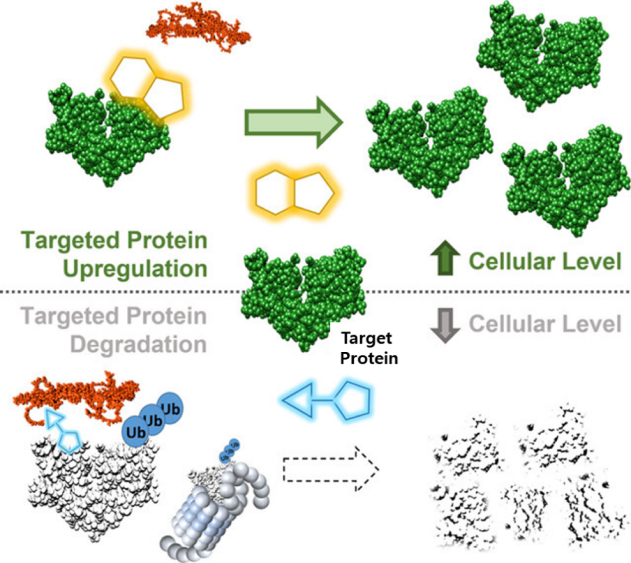MOLECULAR SPLITTER FOR TARGETED
PROTEIN UPREGULATION
- How we make undruggable target proteins druggable
- Molecular Splitter for Targeted Protein Upregulation is a technology that increases the expression of a specific target protein by regulating its interaction with the E3 ligase counterpart in a strategy opposite to PROTAC (PROteolysis-TArgeting Chimera).
A Protein-Protein Interaction (PPI) is an interaction between two or more proteins to form a protein complex that regulates specific biological processes such as metabolism, immune response, organogenesis, and so on.
One of the most well-known strategies that regulate PPIs is PROTAC (PROteolysis-TArgeting Chimera), Targeted Protein Degradation Technology, which puts together target protein and E3 ligase for rapid protein degradation. Despite several PROTAC’s limitations such as limited therapeutic window and non-specific protein degradation, it has been attracting a lot of attention and expanding the application areas in drug discovery and development. The success of the PROTAC approach suggested that the opposite approach to stabilize target protein may be applicable to drug discovery, too.
Here, we are introducing a new approach for drug discovery: Molecular Splitter for Targeted Protein Upregulation (MSTPU). The MSTPU is a technology to inhibit the interaction between target protein and counterpart proteins such as E3 ligase(s) with small molecules or protein-based ligands and subsequent protein degradation, resulting in prolonged target protein stability and biological function. It is applicable to various target proteins that higher expression level leads to better prognosis.

MSTPU is a technology to increase the stability or activity of the target protein, which may be useful in regulating specific biological processes that are applicable to various therapeutic areas.
Because the technology is based on the interaction between two proteins, it can be very specific, minimizing the risk of unintended consequences and off-target effects. This specificity can improve safety by reducing the risk of adverse events.
Publications
-
1.
Targeted Protein Upregulation of STING for Boosting the Efficacy of Immunotherapy. Cho, W.S.†, Won, S.C.†, Choi, YN., Yi, S.Y., Park, J.B., Park, J.G., Kim, C.E., Narayana, C., Kim, J.H., Yim, J.H., Choi, Y.I., Lee, D.S.*, Park, S.B.* Angew. Chem. Int. Ed. 2023, 62, e202300978
-
2.
STING upregulation strategies to potentiate STING immunotherapy. Cho, W.S., Lee J.H., Park, S.B.* Future Medicinal Chemistry.
(Article in Press)
